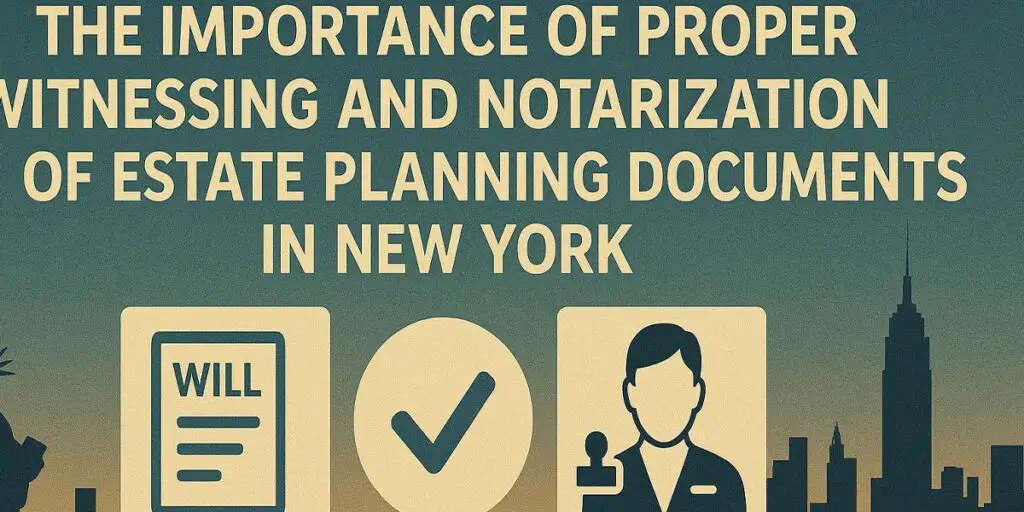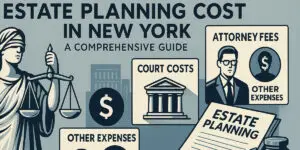The Importance of Proper Witnessing and Notarization of Estate Planning Documents in New York: Ensuring Validity and Preventing Challenges
Creating a comprehensive estate plan involves more than just drafting the legal documents; it also requires ensuring those documents are properly executed according to New York law. Proper witnessing and notarization are crucial formalities that validate estate planning documents, such as wills, trusts, powers of attorney, and healthcare proxies. Failing to comply with these requirements can render your documents invalid, potentially leading to unintended consequences and costly legal challenges. At Morgan Legal Group, serving New York City and beyond, we emphasize the importance of proper execution and provide meticulous attention to detail to ensure our clients’ estate planning documents are legally sound. This comprehensive guide will explore the key requirements for witnessing and notarizing estate planning documents in New York, providing valuable insights into the process and how to avoid common errors that can invalidate your plan. Ensuring your documents are legally sound requires careful attention and expertise.
Why Proper Witnessing and Notarization Matters
Witnessing and notarization serve as safeguards against fraud and undue influence, verifying that the person signing the document is doing so willingly and with the capacity to understand its contents. These formalities also provide evidence of the document’s authenticity and can prevent challenges to its validity in court. Proper execution is essential for a legally sound estate plan.
Without proper witnessing and notarization, your estate planning documents may be deemed invalid, resulting in:
- Your assets being distributed according to New York’s intestacy laws, rather than your wishes.
- Increased risk of family disputes and legal battles.
- Delays and expenses in the probate process.
- Loss of control over your healthcare decisions.
Protecting your legacy requires strict adherence to legal formalities.
Key Documents Requiring Witnessing and/or Notarization in New York
Several estate planning documents in New York require proper witnessing and/or notarization to be valid. These documents include:
- Last Will and Testament: Requires both witnessing and notarization.
- Durable Power of Attorney: Requires notarization.
- Healthcare Proxy: Requires either witnessing or notarization.
- Living Will: While not legally required, notarization is highly recommended.
- Deeds Transferring Real Estate: Requires notarization.
- Certain Types of Trusts: Depending on the specific provisions of the trust agreement, notarization may be required.
It’s important to understand the specific requirements for each document and to ensure they are properly executed. Expert guidance is essential for compliance. Ensure all legal documents adhere to these guidelines.
Specific Requirements for Will Witnessing in New York
New York law sets forth specific requirements for witnessing a will. These requirements must be strictly followed to ensure the will is valid. The requirements include:
- Two Witnesses: The will must be witnessed by two individuals who are not beneficiaries under the will.
- Testator’s Signature: The testator (the person making the will) must sign the will in the presence of the witnesses.
- Witness Attestation: The witnesses must sign the will, attesting that the testator signed the will in their presence and that the testator appeared to be of sound mind.
- Attestation Clause: The will should include an attestation clause, which is a statement at the end of the will that summarizes the execution requirements and confirms that they have been met.
The witnesses must sign the will within 30 days of each other. Failure to comply with these requirements can invalidate the will. Following these protocols ensures that your will is valid. Proper will witnessing provides a layer of security.
Who Can Serve as a Witness? Qualifications and Disqualifications
Not just anyone can serve as a witness to a will. To be a qualified witness, an individual must:
- Be at least 18 years old
- Be of sound mind
- Not be a beneficiary under the will (or the spouse of a beneficiary)
Using a beneficiary as a witness can invalidate the will or, at minimum, invalidate the bequest to that witness. Choose your witnesses carefully to avoid any potential problems. Qualified witnesses ensure the validity of your will. A well-informed witness is an ethical witness.
The Role of the Attestation Clause: Providing Evidence of Proper Execution
An attestation clause is a statement at the end of the will that summarizes the execution requirements and confirms that they have been met. The attestation clause provides evidence that the will was properly signed and witnessed and can help prevent challenges to its validity in court. This clause summarizes the steps taken.
A typical attestation clause will state:
- That the testator signed the will in the presence of the witnesses
- That the witnesses signed the will at the testator’s request
- That the testator appeared to be of sound mind
Including a complete and accurate attestation clause is highly recommended.
Notarization Requirements for Powers of Attorney and Other Documents
In New York, a durable power of attorney must be notarized to be valid. Notarization involves having your signature acknowledged by a notary public, who verifies your identity and witnesses your signature. The notary public affixes their seal and signature to the document, attesting to the fact that you signed it willingly and with proper identification. These steps help verify your identity.
Notarization helps prevent fraud and ensures the power of attorney is authentic. A valid photo ID is usually required. Ensure you bring proper identification.
The Role of a Notary Public: Verifying Identity and Witnessing Signatures
A notary public is an individual authorized by the state to administer oaths and affirmations, take acknowledgments, and perform other notarial acts. When notarizing a document, the notary public verifies your identity, witnesses your signature, and affixes their seal and signature to the document. A notary also must provide certain warnings as part of the execution.
The notary public’s role is to:
- Verify your identity
- Witness your signature
- Ensure you are signing the document willingly
- Complete the notarial certificate
Notarization provides an independent verification of your signature and intentions. Check with New York state guidelines.
Acceptable Forms of Identification for Notarization in New York
To have your signature notarized in New York, you must present acceptable identification to the notary public. Acceptable forms of identification typically include:
- A valid driver’s license
- A valid passport
- A valid government-issued identification card
The identification must be current and contain your photograph and signature. The notary public will verify your identity by comparing your appearance and signature to the information on the identification. Ensure your ID is up-to-date and valid. Expired documents are not accepted.
Consequences of Improper Witnessing or Notarization
Failing to comply with the witnessing and notarization requirements for estate planning documents can have serious consequences. If a document is not properly executed, it may be deemed invalid by the court, resulting in:
- Your assets being distributed according to New York’s intestacy laws
- Your chosen executor or trustee not being appointed
- Your healthcare wishes not being honored
- Costly legal battles among your family members
Protect your legacy by ensuring your documents are properly witnessed and notarized. Expert assistance minimizes the risk of errors. Strict compliance with requirements is essential.
Common Mistakes to Avoid During Document Execution
There are several common mistakes that can invalidate estate planning documents. Avoiding these mistakes is crucial for ensuring your wishes are honored. Be alert for those that are:
- Using beneficiaries as witnesses
- Failing to sign the document in the presence of the witnesses
- Not having the witnesses sign the document within the required timeframe
- Using an expired or invalid form of identification for notarization
- Failing to have the notary public properly complete the notarial certificate
These mistakes can have devastating consequences. Work with an experienced attorney to avoid these pitfalls. Awareness is the first step in prevention.
The Benefits of Using a Mobile Notary Service
In today’s fast-paced world, convenience is key. A mobile notary service can come to your home, office, or other location to notarize your estate planning documents. This can be particularly helpful for individuals who have difficulty traveling or who prefer to have their documents notarized in a familiar setting. A mobile notary offers flexibility and convenience. These services are especially helpful to individuals who have difficulty traveling.
When using a mobile notary service:
- Ensure the notary public is properly licensed and insured in New York.
- Verify their identity and credentials.
- Confirm that they are familiar with the requirements for notarizing estate planning documents.
Choose a reputable and experienced mobile notary. Proper verification ensures validity.
Updating Your Executed Estate Planning Documents: Review and Re-Sign When Necessary
Even if your estate planning documents were properly witnessed and notarized when they were created, it’s important to review them periodically and re-sign them if necessary. This is particularly important if there have been significant changes in your life, such as marriage, divorce, the birth of a child, or a change in your financial situation. You also may need to re-sign the documents if the named agent or trustee changes. Keeping documents up to date is important.
Reasons to review and re-sign your documents:
- To ensure they accurately reflect your current wishes
- To comply with changes in the law
- To prevent challenges to their validity in the future
Regular maintenance is essential for a successful estate plan. Don’t let changes in your life render your plan ineffective.
Consulting with a New York Estate Planning Attorney: Protecting Your Legacy
Navigating the complexities of estate planning and ensuring your documents are properly witnessed and notarized can be challenging. Working with an experienced New York estate planning attorney is essential for protecting your legacy and ensuring your wishes are honored. An attorney can provide:
- Expert guidance on the legal requirements for executing estate planning documents
- Assistance with finding qualified witnesses and notaries public
- Review of your documents to ensure they are properly executed
- Representation in court if your documents are challenged
Don’t take chances with your future – seek legal assistance to ensure your estate plan is properly executed and legally sound. Take action now to protect your loved ones. A trusted attorney is your partner in estate planning.
Morgan Legal Group: Your Trusted Partner in Estate Planning
At Morgan Legal Group, we understand the importance of proper witnessing and notarization of estate planning documents. Our experienced attorneys are dedicated to providing meticulous attention to detail and ensuring our clients’ documents are legally sound and enforceable. Contact us today to schedule a consultation and learn more about how we can help you protect your legacy. Google My Business link is available here. We are here to answer your legal questions with Elder Law, Probate, Family Law, Wills and Trusts, Estate Planning and Guardianship. Plan for the future.
Morgan Legal Group proudly serves the New York City community including the Bronx, Brooklyn, NYC, Queens, and Staten Island. If you are outside of New York City we also serve Long Island including Suffolk County. As well as Westchester, Ulster County, and Orange County.NY Courts









